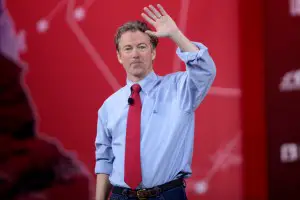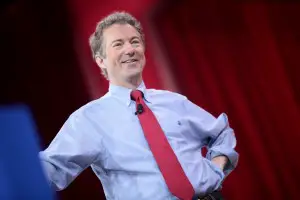
Kentucky Senator Rand Paul recently made controversial comments on GMO labeling. PHOTO: Gage S./Flickr
Enjoying a large national platform for years thanks in large part to the popularity of his father Ron, Rand Paul has been seen as a dark horse presidential candidate for quite awhile now.
Ron Paul was embraced for his willingness to take the establishment to task on controversial issues such as the powers held by the Federal Reserve Bank and the military industrial complex.
His son Rand has shown some of the same moxie and rebellious attitude at times, but hasn’t come close to gaining the same following as his father, in large part because many feel he can’t be trusted to do the right thing in the face of adversity like his father.
Now polling at sixth place among Republican-leaning voters according to the Washington Post, Paul needs to make up ground in a hurry.
But his latest comments on one of the biggest sticking points for voters fed up with crony capitalism in America, the highly controversial GMO foods, could have him losing more trust in the eyes of supporters and potential voters alike.
Rand Paul: 94% of Americans are Wrong on GMOs
In the eyes of the public, mandatory GMO labeling is a slam dunk: over 90% of Americans consistently say they want it, and a recent MSNBC poll put a punctuation mark on that fact as over 94% of more than 135,000 voters said they want mandatory labeling as well.
Mandatory labeling is a right afforded to residents of over 60 countries, and millions believe it’s necessary because it’s virtually impossible to tell GMO foods from regular by sight alone.
And yet despite these facts, Paul recently announced that he is opposing the will of the people while working the campaign trail in Iowa, telling reporters that GMO labeling is the wrong move for America’s poor.
“The labeling requirements are enormously expensive and just add to the cost of foods. Somebody who is poor can’t buy as much food because of requiring labels to be stuck on things,” Paul told Agri-Pulse according to this article from The Libertarian Republic.
Paul was asked about mandatory labeling in regards to the infamous ‘Safe and Accurate Food Labeling Act,’ aka the DARK (Deny Americans the Right to Know; learn more here) Act that actually would ban mandatory labeling.
Paul Just Playing His Role as A Libertarian?
The question of how Ron Paul and other libertarian style candidates would handle the GMO issue has long been pondered.
Paul attempted to clarify his position on GMO labeling in the following statement: “I don’t think we ought to be involved with labeling at all so I’m an outlier in that I don’t fit neatly in one category or the other,” he said.
 The Kentucky senator continued saying that he was “conflicted about using the federal government to prevent states from introducing labeling policies.”
The Kentucky senator continued saying that he was “conflicted about using the federal government to prevent states from introducing labeling policies.”
He also added that he is “not for mandates to any sector of the economy,” a stance consistent with libertarian values.
So, what was Paul trying to accomplish with his comments on GMO labeling? Perhaps he was trying to maintain focus on the economy, an area where he knows he needs to make a splash in, in order to win votes. Or perhaps he was trying to pander to Iowa influencers in a state known for it strong support of GMO crops.
Regardless of his intentions, the question now becomes, was he actually right?
GMO Labeling Not “Enormously Expensive” By Any Means
Will the addition of a simple label stating that a food contains GMOs really be enough to keep, or even drive some families into the poor house?
犀利士
tyle=”font-size: medium;”>According to a study by the pro-labeling Consumers Union, that answer is a resounding “No.” Their study found that the cost passed on to the consumer would be a paltry $2.30 annually.
The seemingly pro-GMO source of the article (The Libertarian Republic) however, noted a Cornell researcher’s study that an average family of four would pay $500 a year extra in food costs as support for Paul’s argument (a little over $40 per month if true).
Meanwhile in Europe (which admittedly has a much better supply chain for non-GMO ingredients), predictions of increased costs due to GMO labeling proved to be greatly exaggerated:
“When the current labeling regime was introduced in 1997, it did not result in increased costs, despite the horrifying (double-digit) prediction of some interests,” said David Byrne, former European Commissioner for Health and Consumer Protection.
Regardless of which example you believe is best, one thing is certain: to call GMO labeling “enormously expensive” shows a clear misunderstanding by Paul, and adds yet another reason to question whether he’s become out-of-touch with the true people’s movement in the United States.
Thanks for installing the Bottom of every post plugin by Corey Salzano. Contact me if you need custom WordPress plugins or website design.




